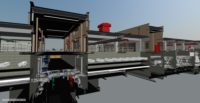Since the 1950s, America's infrastructure development and maintenance program has depended in great part on an end-user tax on fuel. More efficient auto and heavy-truck fuel consumption, combined with an ever-enlarging and aging infrastructure system, have brought us to the limit of the end-user fuel tax as a sole source of revenue. The public has little appetite for increasing the end-user sales tax to replenish the Highway Trust Fund. Although industry and government have pushed new sources of financing and tried to cut costs, little real progress will be made without a new source of revenue, and the Highway Trust Fund will continue to erode.
 |
| Jones |
Of course, the cost of the tax will be passed, ultimately, to the users of the fuel and other products. But the taxes would be spread over more products and more users, helping to end the never-ending crisis over the Highway Trust Fund and the unpredictability of new transportation funds.
Propelled by fracking, U.S. oil and natural-gas production has expanded so much that the country is well on its way to becoming a major exporter of natural gas and oil products.
Analysts predict that, by 2016, the U.S. will exceed its high point of crude-oil production—set back in 1985—and also exceed the all-time production of natural gas. Because U.S. consumers aren't the target customers for much of this additional production, pushing the tax collection point closer to the wellhead would not only be fairer but would change the tax base to an expanding production-based tax from a declining user-based tax.
Taxing Exports
A growing amount of U.S. petroleum products are exported and should be taxed, too. Exports are bound to climb when the Panama Canal opens to even larger ships transporting liquid natural gas to distance countries. Of course, end users in other countries would pay the passed-downed cost of the tax. But this is reasonable because, to be ready for the deep-draft ships that will transport LNG, the U.S. must invest hundreds of millions of new dollars to deepen our ports.
Now, why should a tax on material pushed through a pipeline be used to rebuild roads, transit systems, ports and inland waterways? For many years, these same products were transported by truck and barge, which used taxed fuel for their power. As pipeline construction replaced trucks and barges, part of the historic tax base that supported the Highway Trust Fund gradually dwindled.
The U.S. has 55,000 miles of trunk-line pipelines to transport crude and 95,000 miles of finished product lines, along with 305,000 miles of smaller distribution lines for natural gas and other fuels. This expanded network of 455,000 miles of large and small pipe and distribution line is integrated with the U.S. transportation infrastructure. No interstate highway, city street or bridge can be built or rebuilt without incurring expense for re-locating or providing right-of-way for pipelines of one form or another; likewise, no pipeline can be built or rebuilt without receiving right-of-way or easement to pass under a road or inland waterway.
How much money can be raised this way? The current flow of crude through the American production system is 11 million barrels per day. A tax of just two cents per gallon would produce $3.7 billion a year; a tax on the 30 million-million cu ft of natural gas produced per year would add to that amount. The additional funds won't solve all the transportation problems we face. But with growth expected for years, an expansion of what is taxed would provide a reliable revenue stream far into the future.
Wayne E. Jones is a project manager for Traylor Bros., the transportation contractor, and the 2013 winner of ENR's Award of Excellence. He can be reached at wjones@traylor.com.


Post a comment to this article
Report Abusive Comment